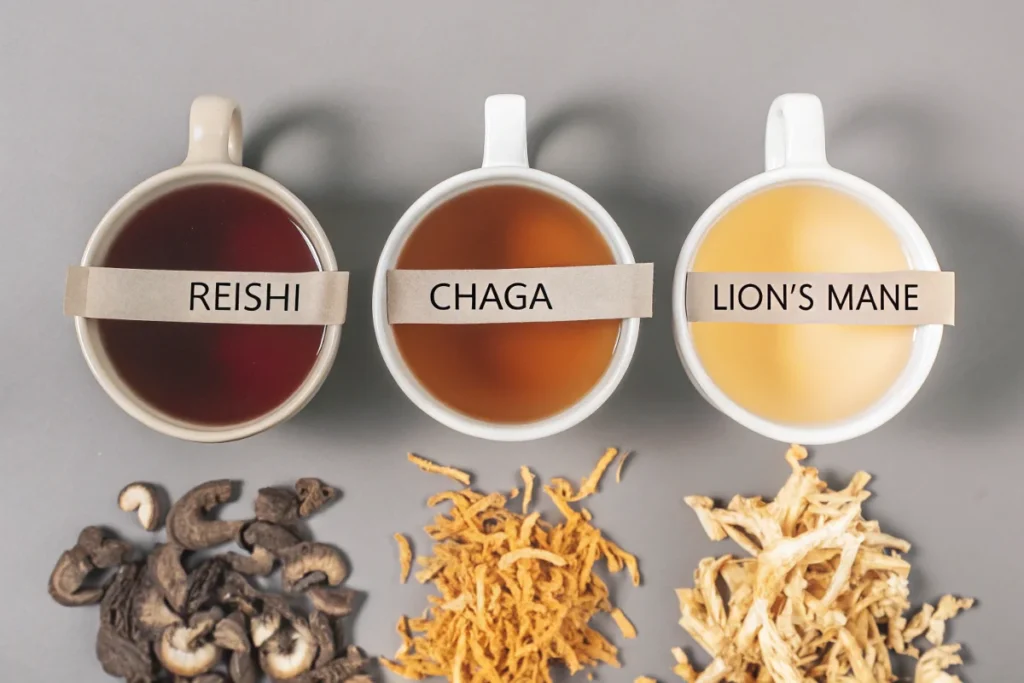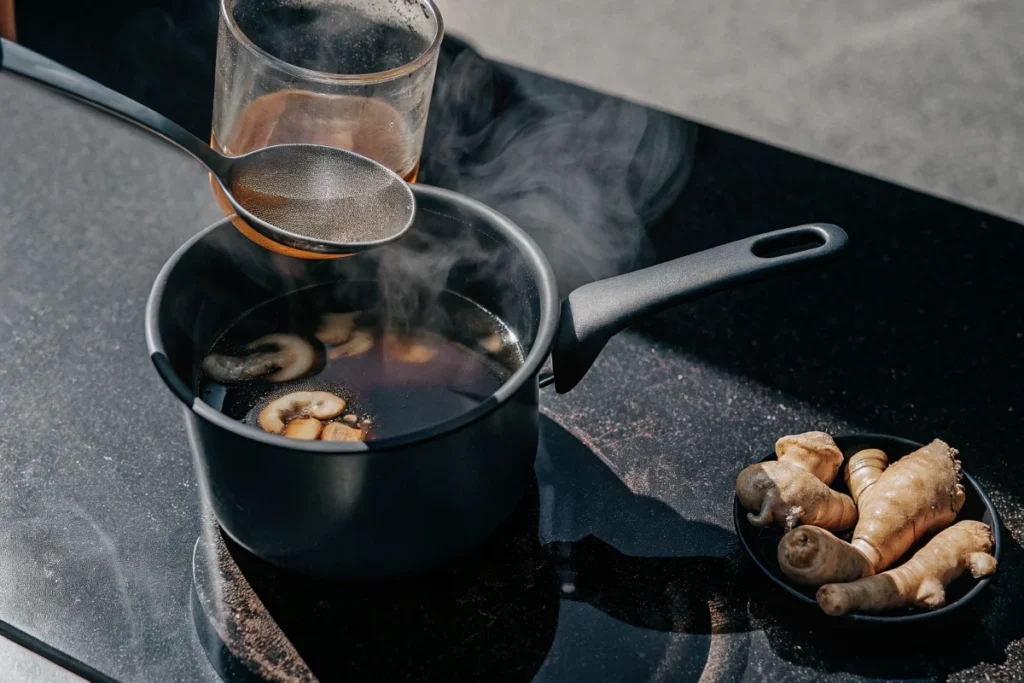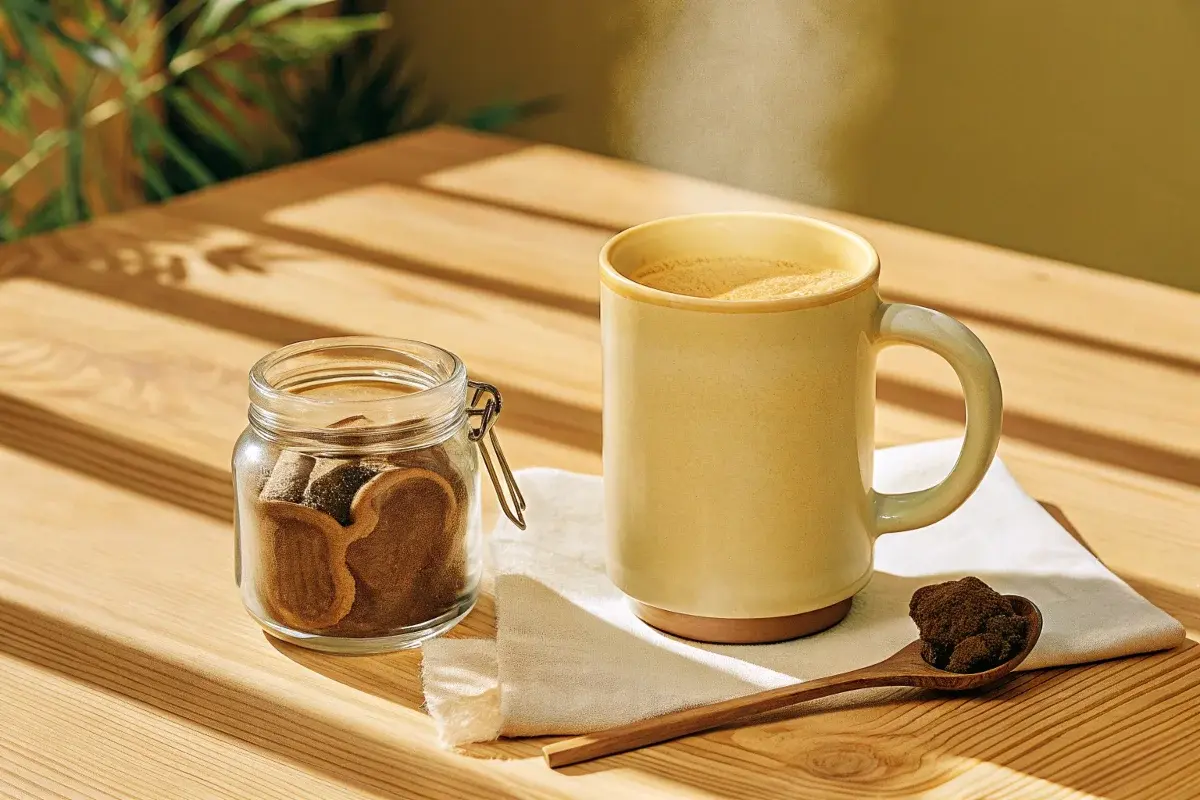Mushroom tea has become increasingly popular in recent years. However, it’s far from a new trend. In fact, this soothing beverage has been cherished for centuries. Today, mushroom tea enthusiasts praise it for its potential health benefits and subtle earthy flavor. In this article, we will take an in-depth look at everything related to this infusion—from its fascinating history to the best brewing techniques, and from its diverse range of varieties to the best time of day to enjoy it. By the end, you will have all the knowledge you need to savor every last sip of this timeless elixir.
Introduction:
Mushroom infusion is more than just a hot beverage. It can be a holistic experience that blends ancient traditions with modern wellness. Therefore, many people who seek a natural way to support health have turned to mushroom tea. This fungi-based infusion caters to those looking for an earthy, mild, and potentially beneficial drink.
In comparison to standard tea varieties such as black or green tea, mushroom tea boasts unique compounds. These may include polysaccharides, antioxidants, and specific phytochemicals linked to the fungi used. For example, Reishi mushroom tea has gained attention for its possible calming properties. However, you can also find Lion’s Mane and Chaga teas, each of which offers its own distinct profile.
Furthermore, brewing the tea offers a moment to slow down. It provides a chance to engage in a ritual that might reduce stress. This sense of intentional living can make every sip more rewarding. By selecting the mushrooms that suit your preferences—whether for their taste or purported health advantages—you have the flexibility to tailor your cup of mushroom tea to your lifestyle.
Key Reasons to Try Mushroom Tea
- Ancient Wellness: Mushroom infusion has a long history in herbal medicine.
- Potential Nutrients: Mushrooms may contain various bioactive compounds.
- Versatility: You can customize your brew with spices, sweeteners, or other herbs.
- Mindful Ritual: The brewing process can encourage calmness and reflection.
Ancient Roots of Mushroom Tea
Mushrooms have fascinated humans for millennia. Therefore, it is no surprise that mushroom infusion has a deep-rooted place in history. Across different cultures—from Traditional Chinese Medicine to Siberian folklore—people have praised mushrooms for their purported healing capabilities. Consequently, they integrated mushroom infusions into daily life and seasonal ceremonies alike.
Early Adoption in Traditional Chinese Medicine
In the realm of Traditional Chinese Medicine, Reishi mushroom tea is celebrated as the “Mushroom of Immortality.” Ancient texts lauded its ability to support vitality. Reishi mushroom tea was believed to harmonize the body’s qi (energy) and fortify overall health. Therefore, it often held a prime spot in the herbal pharmacopoeia.
Siberian and Russian Traditions
Chaga mushroom tea also holds an important role in Russian folk medicine. Siberian tribes discovered Chaga while foraging in harsh climates. Because these mushrooms grew on birch trees, they adopted them for both food and medicinal infusions. In many areas, Chaga mushroom tea became a staple beverage to combat the cold, offering warmth and possible immunity benefits.
Spiritual Connections
In several indigenous communities, mushrooms have been considered sacred. For instance, some cultures believed mushrooms connect individuals with the spiritual realm. As a result, mushroom tea played a role in ceremonies aimed at seeking guidance or healing.
Through centuries of use, mushroom tea has transcended cultural boundaries. Even now, its ancient traditions shape our modern understanding of wellness drinks.

Types of Mushroom Tea
Mushroom tea is not just one type of beverage. Instead, it comes in various forms depending on the species of fungi used. Each type carries its own set of qualities, flavor profiles, and anecdotal health benefits. Therefore, picking the right mushroom can align with your specific goals, such as immune support or mental clarity.
Below are some of the most popular types of mushroom tea you’ll encounter. While they share certain similarities, each has unique features that set it apart.
Chaga Mushroom Tea
Chaga mushroom tea offers an earthy, slightly bitter taste. However, it also carries a hint of vanilla-like sweetness. Chaga mushrooms are often harvested from birch trees in cold climates. Consequently, many people consider them a nutritional powerhouse. They are often linked to antioxidant support.
- Flavor: Earthy, with mild sweetness
- Potential Benefits: May help support immune function, antioxidant activity
- How to Brew: Simmer Chaga chunks or powder in water for at least 15 minutes
Reishi Mushroom Tea
Reishi mushroom infusion, often called the “King of Mushrooms,” is known for its distinctive bitter flavor. Therefore, many prefer adding sweeteners, such as honey or stevia. Reishi mushroom infusion may promote calmness and healthy sleep patterns. However, pregnant or breastfeeding individuals should consult a healthcare provider before consuming large amounts.
- Flavor: Mildly bitter, earthy
- Potential Benefits: Promotes relaxation, supports immune function
- How to Brew: Steep Reishi slices or powder in simmering water for 20–30 minutes
Lion’s Mane Mushroom Tea
Lion’s Mane mushroom tea contains compounds that might support cognitive function. In fact, research suggests that Lion’s Mane contains nerve growth factors that could contribute to mental sharpness. Therefore, those interested in clarity and focus might gravitate toward this variety of mushroom tea.
- Flavor: Subtly sweet, slightly savory
- Potential Benefits: Potential cognitive support, brain health
- How to Brew: Steep powdered or dried Lion’s Mane for 10–15 minutes
Potential Health Benefits
Although definitive clinical research is ongoing, anecdotal evidence and preliminary studies highlight many possible advantages linked to mushroom infusion. Therefore, it’s important to understand these benefits in the broader context of a balanced lifestyle. Below are some of the commonly cited benefits, though individual experiences vary.
- Immune Support
- Polysaccharides and Beta-Glucans: Certain mushrooms, like Reishi and Chaga, contain complex sugars. These may support immune system function and promote a healthy inflammatory response.
- Antioxidants: Because mushrooms often contain high levels of antioxidants, they might help neutralize free radicals in the body.
- Stress and Mood Regulation
- Adaptogenic Qualities: Some mushrooms, such as Reishi, are believed to be adaptogens. Therefore, they might help the body adapt to stress.
- Cortisol Management: By potentially balancing cortisol levels, these fungi could contribute to a sense of calm.
- Cognitive Support
- Nerve Growth Factors: Lion’s Mane mushroom tea stands out for possibly stimulating nerve growth factors. Consequently, it may bolster mental focus and memory.
- Neuroprotective Properties: Preliminary studies suggest that certain mushroom compounds may shield brain cells from oxidative stress.
- Gut Health
- Prebiotic Fiber: Mushrooms can contain prebiotic fiber that may feed beneficial gut bacteria.
- Digestive Enzymes: Mushroom tea might offer trace amounts of enzymes, though the full extent of these benefits requires more research.
- Energy and Endurance
- Cordyceps Support: Mushroom tea variants that include Cordyceps might boost oxygen utilization. Therefore, some people report sustained energy.
- Balanced Energy Release: Instead of the jitters linked with caffeinated beverages, mushroom infusion tends to provide a gentler lift.
It’s worth noting that while mushroom infusion may offer these benefits, it should not replace medical treatment. Consult a healthcare professional before drastically changing your diet or supplement regimen.

How to Prepare Mushroom Tea
Creating a perfect cup of mushroom infusion involves more than simply pouring hot water over dried fungi. Because mushrooms have dense cell walls, a thorough extraction process can help release their beneficial compounds. Therefore, a slow, gentle simmer is often recommended.
Step-by-Step Brewing Guide
- Choose Your Mushroom Base
- Select from Reishi, Chaga, Lion’s Mane, or other mushroom tea varieties.
- Opt for high-quality, organic sources whenever possible.
- Measure Your Ingredients
- Use about 1–2 teaspoons of mushroom powder or small chunks per cup of water.
- Adjust according to your taste preferences and potency goals.
- Simmer and Steep
- Bring water to a gentle boil, then reduce heat.
- Let the mushroom simmer for 15–30 minutes.
- Some teas, like Chaga, might benefit from longer simmering (up to an hour).
- Strain the Liquid
- If you used chunks, remove them with a slotted spoon.
- For powders, use a fine-mesh strainer or cheesecloth.
- Flavor Enhancements
- Add honey, lemon, or other natural sweeteners if desired.
- For a spicy kick, incorporate fresh ginger.
- Enjoy or Store
- Drink your mushroom infusion immediately, or store it in the refrigerator for up to 48 hours.
- Reheat gently on the stove, avoiding a rolling boil to preserve delicate compounds.
Brewing Tips
- Avoid Boiling for Too Long: Over-boiling may degrade some nutrients.
- Cover the Pot: This helps retain volatile compounds.
- Experiment with Combinations: Mushroom tea can be blended with green or herbal teas for a unique flavor experience.
Enhancing the Flavor of Mushroom Tea
Although mushroom infusion can be delicious in its natural form, some people prefer added flavors. Therefore, experimenting with different ingredients can transform the taste while preserving the tea’s natural character.
Top Flavoring Options
- Natural Sweeteners: Honey, maple syrup, or agave can offset any bitterness.
- Herbs and Spices: Ginger, cinnamon, clove, or cardamom lend a warm, aromatic touch.
- Citrus Zest: Lemon or orange zest can brighten the earthy profile.
- Milk Alternatives: Coconut or almond milk can provide a creamy texture.
Pairing Suggestions
- Morning Cup: Try adding a pinch of turmeric and black pepper to Chaga mushroom infusion for a bold wake-up call.
- Evening Wind-Down: Mix Reishi mushroom tea with chamomile for a gentle, calming infusion.
- Study Session: Enhance Lion’s Mane mushroom tea with rosemary for added mental sharpness.
Consequently, these pairings might make mushroom infusion more approachable for newcomers. They also offer variety for those seeking something beyond the traditional mushroom flavor profile.
Possible Side Effects and Precautions
Mushroom infusion is generally considered safe when consumed in moderation. However, individual experiences can vary. Therefore, it’s crucial to be aware of possible side effects and to consult a healthcare professional if you have specific concerns.
- Allergic Reactions
- Some people may experience itching, swelling, or digestive discomfort.
- Always start with a small serving when trying a new mushroom tea.
- Interactions with Medications
- Reishi mushroom tea may interact with blood thinners or certain anti-hypertensive drugs.
- Cordyceps might affect blood sugar levels, so diabetics should be cautious.
- Excessive Consumption
- Drinking too much mushroom infusion could lead to imbalances, such as upset stomach or mild fatigue.
- Stick to recommended serving sizes and consider cycling different types of mushroom tea.
- Quality Concerns
- Always buy from reputable sources.
- Mushrooms can absorb toxins from their environment, so organic or lab-tested brands are preferable.
Furthermore, pregnant or nursing individuals, as well as those with existing health conditions, should consult a medical professional before adding mushroom tea to their daily routine. Moderation remains key to enjoying the beverage without adverse effects.
Optimal Times to Enjoy Mushroom Tea
Timing can influence how your body responds to mushroom tea. While there’s no universal “best” time, certain varieties may prove more beneficial at specific points in the day. Therefore, experimenting can help you find your ideal schedule.
Morning Boost
- Chaga Mushroom Tea: Many people enjoy Chaga in the morning because of its robust flavor and potential antioxidant content.
- Lion’s Mane Mushroom Tea: Ideal for mental clarity and focus at the start of a busy day.
Midday Pick-Me-Up
- Cordyceps Mushroom Tea: Known for potential energy support, Cordyceps tea can be a good alternative to caffeine-laden drinks.
- Blends: Combine Cordyceps with black tea or matcha for an extra kick.
Evening Wind-Down
- Reishi Mushroom Tea: This variety is often tied to relaxation and stress relief. Therefore, it can be an excellent choice before bed.
- Chamomile and Reishi Fusion: Mixing Reishi with chamomile or lavender may promote restful sleep.
Selecting the right mushroom tea for each time of day can lead to a well-rounded approach that supports both mental and physical well-being.
FAQ:
Below are some commonly asked questions about mushroom tea. Each answer offers insights to help you make an informed decision and enhance your overall experience.
What does mushroom tea do to your body?
Mushroom infusion can potentially support your immune system, provide antioxidants, and promote relaxation or mental clarity, depending on the variety. For example, Lion’s Mane mushroom tea might aid focus, while Reishi mushroom infusion may help you unwind. However, individual results can differ based on factors like dosage and overall lifestyle.
When should you drink mushroom tea?
You can drink mushroom infusion at any time of day. However, consider your personal health goals. For an energy boost, enjoy Lion’s Mane or Cordyceps in the morning. If you want to wind down in the evening, Reishi mushroom tea might be more suitable. Experiment with different timing to find what best fits your routine.
Who should not drink Reishi mushroom tea?
Individuals taking blood thinners or those with low blood pressure should exercise caution. Additionally, pregnant or breastfeeding women should consult a healthcare professional before adding Reishi mushroom tea to their regimen. Always start with a small amount to monitor any possible adverse reactions.
What does mushroom tea taste like?
Mushroom tea generally has an earthy, woodsy flavor. Chaga tea often has a subtle hint of sweetness. Reishi mushroom tea is more bitter, and Lion’s Mane can taste slightly sweet and savory. Flavor enhancers like honey, ginger, or lemon can help balance out any bitterness.
Conclusion: Embracing the Mushroom Tea Tradition
Mushroom infusion continues to captivate the wellness world for good reason. It merges age-old traditions with modern, evidence-based findings. Consequently, many people find mushroom infusion both satisfying and potentially beneficial. Whether you’re seeking a morning energy lift, cognitive support, or a calming evening routine, mushroom infusion has a variety suited for your needs.
Furthermore, the ritual of brewing mushroom tea encourages mindful living. You can explore different mushroom varieties, combine them with other herbs, and create a personalized experience that nourishes both body and mind. Ultimately, embracing mushroom tea is not just about sipping a warm beverage. Rather, it’s about connecting with a tradition that spans continents and cultures, offering you the chance to become part of that timeless story.

